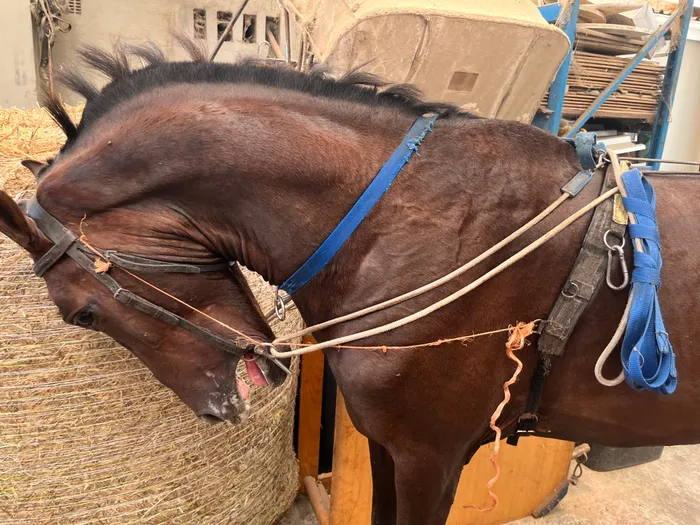Cape Town horse owner arrested for animal torture, assault of SPCA inspector

This trianing has been referred to as torture by the SPCA. Photo: SPCA
Cape Town - The Cape of Good Hope Society for the Prevention of Cruelty to Animals (SPCA), intervening in an animal cruelty case, also filed charges of assault after the owner of horses in Grassy Park.
According to the organisation, its inspectors had to obtain a court order to gain access to the property after the owner denied them access to conduct an inspection.
This resulted in the confiscation of four Saddle horses, being kept in poor living conditions and subjected to cruel training methods.
The SPCA said this comes after it received a complaint about horses being kept in poor living conditions as well as a strong smell of ammonia lingering in the area with an excessive amount of flies due to the dirty living conditions. This spurred its inspectors to probe the complaint.

Upon arrival at the address in Grassy Park, inspectors were denied access by the owner, who demanded they return with a court order.
Inspectors approached the Wynberg Magistrate’s Court for an order in terms of the Animals Protection Act to gain access to the property to investigate. They were granted the order.
On Wednesday, SPCA inspectors returned to the property with a court order in hand.

They were accompanied by members of the Grassy Park South African Police Service (SAPS) and the City of Cape Town’s Law Enforcement: Animal Control Unit.
Upon arrival, there were immediate suspicions.
A woman, who was in the front of the property, insisted the team of officials remain in the front while she called the owner.

Chief Inspector Jaco Pieterse and Inspector Jeffrey Mfini felt uncomfortable with the arrangement and followed the woman into the property.
Realising the inspectors were right behind her, the woman tried closing the gate leading to the back of the property and informed the owner they were there.
Pieterse said the owner was not happy with the SPCA on his property, especially as he was training the Saddle horses using a cruel and archaic training method.

The inspectors were left horrified.
Pieterse said a Saddle horse stallion was found restrained.
“His head had been forced down onto his chest, and his neck was forced into a tight hyper flexed arched bow and then tied into this unnatural position.
“Tight pieces of rope tied from his bridle, through his bit and onto a roller ensured that the poor animal could neither lift nor lower his head at all or move it either side to get the smallest respite from this muscle torture or mouth pain.

“The horse had been subjected to this suffering for an extended period of time.
“He was drenched in sweat, veins and blood vessels swollen with exertion.
“The white foam that thickly covered his mouth and entire nose, as well as her wide eyes and tightly tensed facial muscles, spoke volumes as to his extreme state of distress,” Pieterse said.
He said one of the handlers attempted to quickly untie the rope to stop the inspectors from getting any photos and video footage of the cruel training method applied.

However, inspectors were quick and managed to gather evidence for criminal prosecution.
Further investigation led the inspectors to three more Saddle horses being kept in the back of the property in what is described to be unsuitable stables.
A strong ammonia smell lingered in the air.
Pieterse said it was dark in the so-called stables, with little to no ventilation, and the horses only had access to dirty drinking water, with living conditions dirty and unhygienic.

“This torture technique, almost similar to the Rollkur technique, involves the forced, aggressive, over-flexion of the horse’s neck, with the effect of forcing the horse into an artificial outline demand for competing Saddle horses and holding it in that position for long periods. This is beyond cruelty,” Pieterse said.
He said this practice is extremely cruel and causes extreme mental and physical distress to any animal subjected to this torturous training technique.
“It holds no benefit to the animal and is a cruel and selfish practice by the owner to improve the animal’s competition performance.
“Hyper-flexion affects the animal’s ability to breathe in by causing a dynamic obstruction of the upper respiratory tract because of the severe bend collapsing the vocal folds as the huge lungs try to suck air into the body – imagine slowly suffocating as you fight for each breath. The extreme pressure on the parotid gland is evident by excessive salivation.
“If used routinely, this torture technique has been known to cause muscle tears, bone spurs and degeneration of the spine due to the vertebrae being forced into an abnormal position,’ Pieterse said.
He said the owner was hostile and continuously shouted at inspectors.
Members of the SAPS had to intervene. As soon as the owner was informed his horses would be confiscated, he became violent and punched Pieterse with a fist and pushed him out of the way, obstructing him and the team from performing their duties.
Police officials immediately intervened.
The owner was arrested, and inspectors filed criminal charges in terms of the Animal Protection Act for animal cruelty as well as for assault.
The horses were confiscated and taken to the SPCA Horse Care Unit for veterinary examination and further care.
IOL
NSPCA probes killing of Sheba, the tigress that escaped from a Gauteng home
SPCA investigates porcupine carcass found on Cape beach
Post mortem reveals aardvark that washed up on a Cape beach died of heart failure
PICS: Suspects arrested for stoning trapped seal at Cape Town beach were to be paid R3 000 by a ‘traditional healer’
WATCH: Santa the seal stops traffic as it crosses a busy Cape Town road
Cape of Good Hope SPCA to file charges against the owner of a pony who allegedly allowed it to be abused by minors in Atlantis